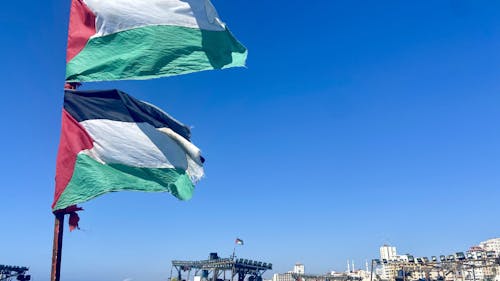COMMENTARY: Deeper meaning of Gaza's beach

Growing up as a Palestinian from Gaza, Baba always took us to the beach. Every vacation consisted of us going somewhere hot and cooling off in the salty water. The truth was that the beach we were really trying to reach was an ocean away, with borders difficult to cross.
During our road trips to the beach, Fairuz's voice was clear but abruptly interrupted every 5 seconds by Baba to question whether my siblings and I understood every word.
"Yallah, repeat, translate and explain," he would say.
For those unfamiliar with Fairuz, she is the Levantine queen of the hearts of the Arab people. Her beautiful voice and music are not just examples of lyrical genius but also personal to each of us. Her most famous album, "Jerusalem in My Heart," resonated with every Palestinian living in exile or under occupation.
Our road trips with Baba teaching us Arabic through Fairuz's poetic music and singing about returning to our homeland as we headed to the beach was our form of resistance.
Gaza is known for many things, but, above all, we are known for our beach. It is our pride and joy, considering the occupation has stolen so much from us. "At least we have a beach" is something we often have to tell ourselves.
The occupation has restricted our movement, thus restricting our freedom, so the only thing all Palestinian Gazans are familiar with is their land, contained within the 365 square kilometer open-air prison.
Especially during the hot summers, the beach is seen as our only escape due to the 17-year blockade. Palestinian Gazans look to the horizon and wonder if they will one day be able to escape the borders.
During the recent temporary truce, Palestinians went to the beach, their "only outlet," to escape the warfare that plagues our minds.
As a Palestinian-American, I did not realize how much the borders kept us apart until I encountered other Palestinian-Americans and the topic of swimming came up. I was surprised to hear they either did not know how to swim or did not do it often. In response, I would ask, "How can you not when you are Palestinian?"
And that is when I remember that my Palestine is not everyone's Palestine.
Walls, checkpoints, barricades and borders separate us into enclaves, with those who grew up living under occupation or exile being unfamiliar with the other side. I have personally experienced others' perception that we, Palestinian Gazans, live on the "wrong" side of the border. But Israeli Occupation Forces (IOF) make it impossible for those who live in the West Bank to reach many beaches along the Gaza Strip.
On my recent visit, after being separated from my family for nine years, I could not wait to get back in the water, just like old times. But I was immediately alerted that I could not swim without the risk of getting sick due to sewer dumpage caused by the blockades.
Simply passing by certain parts of the beach coastline is unbearable due to how bad it smells, and what was once blue water is now a murky brown. The tap water is so salty that whenever you wash your hands, make wudu (ablution) or brush your teeth, my family jokes that you feel like a fish will come out of your mouth.
It is day 116 of the ongoing Palestinian genocide, and Gaza has become unrecognizable to many of us due to its destruction. I believe that this is a crime against humanity.
It is critical to understand the significance of Gaza's beach to know how hurtful it is for Israeli soldiers to be seen raising the Israeli flag, singing their national anthem and posing on Gaza's beach.
The intentions of the state of Israel have been clear from its creation: to eliminate the Palestinian people and their history.
They want us to forget, but 75 years later, we still dream of liberation. Despite the ongoing ethnic cleansing, occupation, apartheid system and increase of settlements, the irony remains that when they forced us out of our home, Palestine never left because Israel failed to replace it.
Soon, we will return to the beach of Gaza in our swimsuits, snacking on bizr (watermelon seeds), drinking mint tea, listening to Fairuz and playing shada (cards), all at the same time.
Students for Justice in Palestine is a student organization at Rutgers University committed to supporting the Palestinian people's right to self-determination.
*Columns, cartoons and letters do not necessarily reflect the views of the Targum Publishing Company or its staff.
YOUR VOICE | The Daily Targum welcomes submissions from all readers. Guest columns and commentaries must be between 600 and 900 words. All authors must include their name, phone number, class year and college affiliation or department to be considered for publication. Please submit via email to oped@dailytargum.com by 4 p.m. to be considered for the following day's publication. Columns, cartoons and letters do not necessarily reflect the views of the Targum Publishing Company or its staff.



